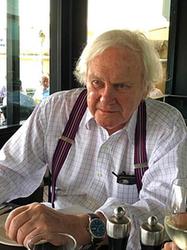 |
|
| Frank Moorhouse | |
Frank Moorhouse, one of Australia’s "most celebrated but also most controversial writers," died June 26, the Sydney Morning Herald reported. He was 83. Moorhouse "lived and wrote about the good life--in both senses of the phrase, sometimes paradoxically. With a passion for fine food, cocktails and justice, he fearlessly wrote about the things essential to him."
Meredith Curnow, his publisher at Penguin Random House Australia, said: "Renowned for his use of the discontinuous narrative in works such as The Americans, Baby and Forty-Seventeen, Frank Moorhouse has been an active participant in Australian literature for nearly 50 years. The office of PEN and the Australian Society of Authors were profoundly influenced by his activism on behalf of all writers.
"The Edith Trilogy, made up of the astounding novels Grand Days, Dark Palace and Cold Light have not only brought immense pleasure to so many readers, but have also affected the career paths of many women. I feel so privileged to have worked with Frank on Cold Light. One of the reasons I will forever adore Frank Moorhouse is his generosity toward new writers and people working in publishing. He loved to sit and learn from younger people and to share his immense wisdom and incredible stories. We will all miss him very much."
Catharine Lumby, who has just finished working on a biography of Moorhouse, described the author as "a literary legend. It was an incredible privilege to have a friendship with him and be his biographer. As always, Frank had to have the last word. I started writing the conclusion to his biography this morning and learnt that he had died."
Moorhouse, who wrote 18 books as well as many screenplays and essays, "was a life-long activist who supported feminism, advocated for gay liberation and supported Indigenous land rights," the Morning Herald noted. In 1988, his novel Forty-Seventeen won the Age Book of the Year and the Australian Literature Society’s gold medal. He was appointed a Member of the Order of Australia for service to Australian literature in 1985.
In the Edith Trilogy, he "explored the Australian identity through the career of Edith Campbell Berry, a young woman who works as a diplomat in Europe, then Canberra, in three novels published between 1993 and 2011," the Guardian wrote, adding that Grand Days, "set in 1920s Europe, was judged to be ineligible for the Miles Franklin literary award in 1994 because it was deemed insufficiently Australian by the judges, a decision that led to Moorhouse taking legal action." Dark Palace, the second book in the trilogy, won the prize in 2001, while Cold Light was shortlisted for it in 2012.
ABC journalist Annabel Crabb, a great fan of Edith Campbell Berry, said: "I know she resonates with a lot of ambitious, energetic, imaginative and slightly shambolic women--I have always identified very closely with her. What was remarkable about Moorhouse was how he could write her in a such a perceptive way. His gender fluidity really marked him. He was a genuine artist."

